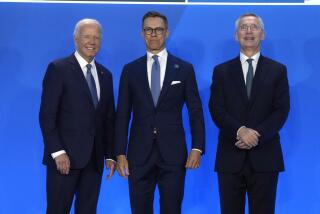U.S., Soviets Reach Drug-Test Agreement
- Share via
MOSCOW — A U.S.-Soviet preliminary agreement, potentially providing for random, out-of-competition drug testing, could be a model for the world, sports officials said Tuesday.
“If two of the most powerful countries in sports can find a mechanism for mutual out-of-competition testing based upon trust with two different social systems to deal with, it would be a tremendous test of a possible model,” said Lyle Makosky, deputy assistant minister for sports and fitness in Canada. “So I think the agreement is a great success.”
The agreement was signed Monday night by Baaron Pittenger, executive director of the U.S. Olympic Committee, and Vasily Gromyko, deputy chairman of the Soviet State Committee for Physical Culture and Sports. It is subject to approval by both nations’ Olympic committees.
Currently, American and Soviet athletes are tested only during the Olympics and other major championships.
The preliminary agreement also could include an exchange of testing labs, lab results and technical data, drug education program and uniform penalties.
No dates have been set, and a decision on how many athletes will be subject to the twice-a-year testing will be announced later, according to Sergei Portugalov, a doctor of medicine on the Soviet Sports Committee.
Yet to be solved is detection of blood doping, a practice in which transfusions of an athlete’s blood are stored for use before an event. Portugalov said it was the only problem in the U.S.-Soviet agreement.
Juan Antonio Samaranch, president of the International Olympic Committee, called the agreement “very helpful” and said the next important step would be to create an international medical commission.
More to Read
Go beyond the scoreboard
Get the latest on L.A.'s teams in the daily Sports Report newsletter.
You may occasionally receive promotional content from the Los Angeles Times.






